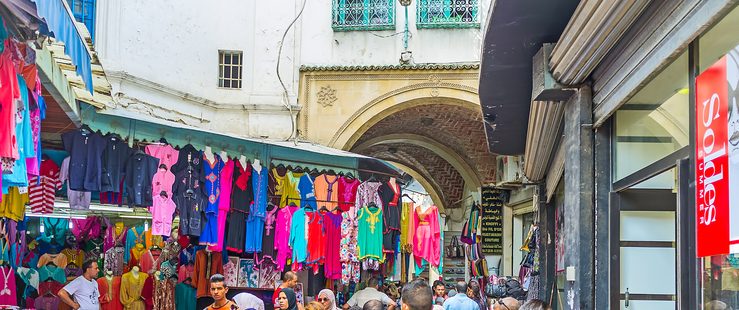Our Opinion: 2018
Bread, Freedom, Dignity in Tunisia

Tunisia, often hailed as the sole success story of the 2011 Arab Spring uprisings, is in danger of being crippled by budget-cutting economic policies that threaten the country’s democratic experiment.
Scholars and economists have warned for years that Tunisia’s economic problems could thwart its political progress. But now a raft of critics are blaming financial measures promoted by international lenders and advisers, and taken up by inexperienced Tunisian politicians, for making them worse off, and allowing an economic and political crisis.
It is a pattern that has played out around the world, in Latin America, Asia and recently Greece, as the International Monetary Fund and other Western lenders demand that governments balance their budgets and open their economies. Those policies often produce jarring hardship and political upheaval that can undermine support for the very kind of democratic and capitalist systems the West is trying to build.
In Tunisia, where the Arab Spring began, those measures are doubly biting for a people who had harboured such great hopes for a fairer society in one of the Arab world’s few democracies.
“Bread, Freedom, Dignity” were the demands of Tunisian protesters who threw off autocracy and sparked the Arab spring seven years ago. Tunisians now have more freedom and some dignity. But bread is scarcer than ever. GDP per person has barely budged since the revolution. That is why Tunisia has once again been mired in protests, this time over higher taxes, lower subsidies and the lack of jobs.
Nine governments in seven years have failed to revive the economy. Tunisians are losing faith in democracy. Some even yearn for the return of Zine el-Abidine Ben Ali, the despot whom they tossed out in 2011. According to today’s rose-tinted nostalgia, he at least ensured that Tunisians had work. In fact, Mr Ben Ali left Tunisians feeling much as they do today: as if they have no future. He also tortured dissidents, oppressed workers and plundered the public coffers.
The best hope for Tunisia is still democracy. But for democracy to arrive, the government needs to put bread on the table, by beginning to fix Tunisia’s economy.
There is much to do. The country is still haunted by the abuses of Mr Ben Ali, who drove away foreign investors. In recent years, a spate of terrorist attacks has scared off sun-loving tourists. At the first hint of cuts to the public sector, the country’s powerful labour unions call people into the streets or cripple the country with strikes. Repairing the economy will take time – and cause pain. But just when patience is needed, mob rule has become the norm.
The government’s first task is economic stability. Youssef Chahed, the prime minister, deserves credit for sticking to his guns over the tax rises and subsidy cuts that led to the recent protests. (He had a nudge from the IMF, which has agreed to lend Tunisia €2.4bn, or $2.9bn.) Even so, the government, an unruly alliance of Nationalists and Islamists, has only haltingly worked to bring down the budget deficit, which was 6% of GDP last year, and to hold down public debt.
Sadly, there is no gain without pain. Mr Chahed must do more to disentangle the state from the economy. 20% of workers have jobs in the public sector; their wages consume almost 14% of GDP, among the highest proportions in the world. Yet firms run by the government are extraordinarily inefficient. The state oil company hired 14% more workers over the past decade—during which time production volumes fell by 29%. Poorly run companies stumble on because competitors face steep barriers to entry in most sectors of the economy. Revenues from the sale of oil, gas and phosphate are not invested in infrastructure that might encourage enterprise, especially in the neglected hinterland, where the commodities are extracted.
Rich countries could do more to help keep Tunisia on track. Yet the US recently cut bilateral aid to the country by two-thirds. France has given relatively little to its former colony. More important, America and Europe could open their markets to more Tunisian goods. In 2016 the European Union raised quotas for Tunisian olive oil, a significant export, for two years. Such deals could be extended, and more thrashed out – on Tunisian dates, vegetables, clothes and machinery.
But the world can do only so much. The burden ultimately falls on Tunisia’s leaders to mend the economy and make the case for democracy. Their caution is prolonging the pain of reform. Tunisians acted boldly in choosing democracy. They must be just as bold in pursuing prosperity.
Tunisia is in poor economic shape. Its gross domestic product is growing at a tepid 2 percent, while unemployment remains at 15.5 percent, and about 30 percent among the young, many of whom while away their days smoking water pipes at cafes with little hope of being able to move out of their parents’ homes. The Tunisian dinar has fallen about 40 percent compared to the euro and the dollar since 2011, increasing prices for fuel and almost all consumer goods. International ratings agencies have repeatedly lowered Tunisia’s creditworthiness, straining the government’s ability to borrow to invest in jobs or public works programs.
In the country where the Arab Spring began, many Tunisians voice longing for a strong leader who can quickly make decisions and put the squabbling political class in its place.
9thMay 2018
